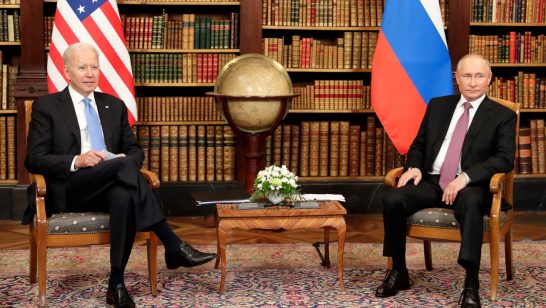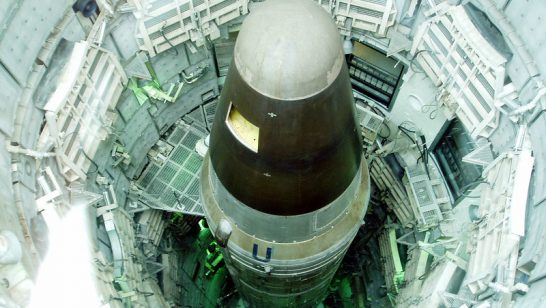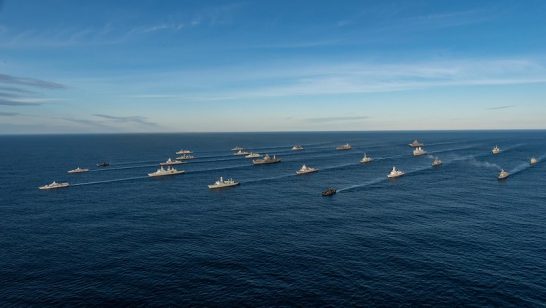
The dim shadow of Reykjavik
When Joe Biden and Vladimir Putin shook hands in Geneva, expectations from the meeting were low. Modest forecasts suggested it would be a step forward simply to revive wider US-Russia working-level discussions at least in some areas. That was exactly what the Russian and American delegations managed to achieve last month, making one small step away from the brink of total failure in bilateral relations. Growing unpredictability, exaggerated by mutual misperceptions and hysteria in the style of the worst Cold War periods, have accelerated the deterioration of mutual trust and have had a negative impact on the Euro-Atlantic security architecture.
It is not yet clear whether Biden and Putin managed to reverse these trends, but they did send signals from the political top to their respective policy communities that the time had come to make relations more structured, predictable and to improve them where possible. After reaching multiple dangerous dead-ends, Russian and American visions of risk management at least partially coincide. After Donald Trump’s era of chaotic policies and decisions vis-à-vis Russia, Joe Biden has introduceda more nuanced and realistic approach. While not abandoning the democratic and human rights dimensions together with sanctions, he has prioritised stability and predictability. The big question now is how and if broad sketches drawn in Geneva can materialise into longer-term policies and what the Euro-Atlantic community at large should take from the summit.
The most important albeit symbolic signal was a joint declaration that a “nuclear war cannot be won and must never be fought”. Thirty-five years ago at the Reykjavik summit, when Ronald Reagan and Mikhail Gorbachev first made this statement, it marked the beginning of the end of the Cold War and led to an important evolution of the European security landscape. It is not likely that we are stepping into the same river again: The current global political landscape is evolving in a competitive rather than cooperative mode, Russia is moving in the opposite direction from the spirit of Perestroika, and a large part of the late Cold War and post-Cold War legacy, both from institutional and cultural standpoints, seems to be lost.
Whereas the late Soviet Union and Russia of the 1990s saw themselves as a part of the global liberal order, modern Russia generally rejects a Western-centric institutional model. Lying behind this is a strong differentiation in values from the West that was fuelled by growing illiberal sentiments in different segments of society and decision making since as early as the 1990s. As outlined in the recently adopted Russian National Security Strategy, “westernisation” undermines Russian “cultural sovereignty”. Russia is not anti-institutionalist per se: the same document proclaims that “Russian foreign policy must improve stability of the system of international relations, resting upon international law, principles of common, united and indivisible security, deepening of multilateral interaction without dividing lines and bloc logic”. It basically means that Russia would accept only those international institutions where it has a voice and is considered as an equal partner.
From Russia-US to Russia-NATO relations
Even though Russia and the US are far from ending negative political rhetoric towards each other, the normalisation of diplomatic ties is an achievable and desirable outcome of the meeting in Geneva. Revival of diplomatic functions, including not only the return of the ambassadors but the reopening of the consulates together with the normalisation of visa regimes should enhance civic, economic and expert ties. It will be a serious litmus test that will show whether both countries are ready to intensify communication in the highest priority security domains and not limit it to ceremonial meetings at the top level. The key subjects identified in Geneva create narrow corridors of opportunity that could lead to a wider cooperation. Cyber security seems to be the most promising of those areas. The cyber sphere long awaits commonly understood definitions, clearer rules and norms of behaviour. Starting from minimal guarantees that Russia and the US are ready to limit their vulnerability to third party cyberattacks would be a necessary first step. The Arctic is another sphere that could foster cooperation, although it is complicated by increasing security divisions in the Arctic Council. Still, Russia and the US could slow down the unfolding politicisation of the Arctic while strengthening economic and ecological aspects of cooperation. Climate change is an unavoidable issue especially after Joe Biden made it one of the strategic priorities for his domestic and global policies. For both Biden and Putin climate change is not only an environmental but also an economic problem as it directly affects Russian and American carbon oriented economies. Joint action plans and coordinated decarbonisation policies can become areas of closer contact between Russia, the US and the European Union. Beyond this, regional security issues around Syria, Afghanistan and Iran also have the potential to become a basis of enhanced diplomatic efforts aimed at preventing further destabilisation in wider Eurasia.
The list of topics discussed in Geneva was surprisingly long, but it lacked the key element of Russia-West confrontation – Russia-NATO relations. While it was probably unrealistic to start talking from a point where both sides have highly diverging views, it doesn’t mean that this topic should be avoided further, especially if there are signs of progress in other areas. Considering that one of the first steps Joe Biden made to strengthen global security was the extension of the New START treaty, it is important to start revising security areas that were left without any regulatory mechanisms – especially after the abolition of the INF and Open Skies treaties.
Unlikely to be restored in their previous form, communication is crucial in these areas. Both Russia and NATO have indicated their positions on controlling land-based intermediate and shorter-range nuclear missiles in Europe. Russia calls for a new moratorium while NATO rejects that idea, although NATO has agreed not to deploy land-based missiles and (as stated in the alliance’s recent communique) keeping doors open “to meaningful arms control discussions and dialogue on reciprocal transparency and confidence-building measures”.
All sides have to look for new compromises in order to restore trust and create functioning instruments for arms control in Europe. It is a long process that will need not only Russian and American voices but those from European states too, as it is Europe that bears the most risks in this period of rising tensions and unpredictability. The problem is that NATO has to find a consensus itself because internal divisions between members do not create conditions for easy solutions. NATO should make use of those countries that traditionally have high-level political contacts with Russia, including Germany and France. Even though Berlin and Paris recently failed to convince members of the European Union to restart top-level dialogue with Russia, it doesn’t mean they are unable to be mediators in more nuanced security issues. In a situation where the NATO-Russia council has its role of a functional channel for dialogue, new forms of communication have to be found. One way to enhance contact is to expand the existing channel for military to military dialogue. Another possibility is to create a mechanism for specific ad hoc meetings that could take place on neutral ground (e.g. Vienna or Geneva) and be dedicated to less toxic areas of Russia-NATO relations, such as cyber security and the Arctic (serving as an additional layer to similar US-Russia discussions). It will be hard to avoid mistrust and hard language will likely stay, but professionalisation of discussion between Russia, the US and NATO will be a responsible move by all sides.
Values, interests and responsibility
Back in 1986, it was the meltdown of ideological rivalry that was the driving force behind the evolution of the security system in Europe. Today security issues have to be managed in a context of purely rational interests, with few illusions left. The Cold War is back in the sense that discourse and identity divisions have returned. Just as the Soviet Union based its ideology primarily on repulsion and criticism of the West, modern Russia has reintroduced this element in its foreign policy while leaving space for pragmatic dialogue in selected areas. Russia’s approach to global cooperation rests not on a specific ideological formula but on a combination of pragmatism and self-sufficiency meaning that Russia will accept only those global rules and norms that correlate with its interests.
The rise of undemocratic and illiberal China is seen by Moscow as an important confirmation of its own opinion that there is no coming back to the Western-centric model. Still, there is one important difference from the Cold War era – Russia just like China are part of the international market system. Russia is willing to distance and even detach itself from the Western political model while remaining within the system of international capitalism and distribution of global goods. Russia’s National Security Strategy states that “drawing up diversified ties with the centres of global development will increase stability of the Russian economy”. While Russia has a big stake in building closer economic ties with the Asia Pacific, and China in particular, it will continue to be highly dependent on trade, investments and technological cooperation with the West.
Russia would want to continue business as usual while legitimising geopolitical and value divisions. It poses a big dilemma for the collective West – what is the right balance between pragmatism, norms and values in relations with Russia? The Biden administration understands this contradiction very well and this is precisely why it will be difficult to manoeuvre between Russia’s geopolitical ambitions and their European allies. The values-pragmatism dualism will remain central to Russia-West relations in the foreseeable future. Finding the right balance between them is the only way to create corridors of opportunity at this stage. Neither side will give up on its values discourse, therefore values should be avoided where possible, especially in those hard security areas that require responsible behaviour.
Biden belongs to the cohort of American politicians who value stable and systematised relations with both friends and adversaries. He will continue to balance sanctions andhawkish opinions against Russia while trying to talk to Moscow in those areas where common interests can be found. Whether that leads to broader communication and negotiations aimed at creating new norms and institutions needs to be answered not only in Moscow and Washington but also in European capitals. European countries need to activate their diplomatic and expert resources while keeping in mind that diplomacy and dialogue are often needed the most when there are disagreements.
As the EU debates its future policy towards Russia, and as NATO turns its mind towards its next strategic concept, a joint European-American approach towards Russia that finds a balance between disagreements and common interests will send Moscow a clear signal that there is a coherent framework for relations with the West. This is the right moment to reinvigorate discussion on European agency. Russia and the US will find ways to cooperate but the core issues of European security can only be addressed with the active engagement of Europeans themselves.
Value divisions between Russia and the West depend on political dynamics and multiple social and economic factors. They cannot be solved easily and will continue to spread mistrust and serve as spoilers for global security in the foreseeable future. However, existing contradictions should not stop Russia and the West from restoring normal diplomatic relations, having sincere discussions on security concerns, and looking for compromises and solutions in areas of mutual challenges and interests.
The opinions articulated above represent the views of the author(s) and do not necessarily reflect the position of the European Leadership Network or any of its members. The ELN’s aim is to encourage debates that will help develop Europe’s capacity to address the pressing foreign, defence, and security policy challenges of our time.
Image: Wikimedia commons



